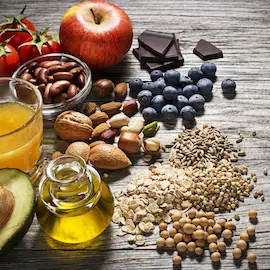Heart disease claims over half a million lives each year in the USA alone. The tragedy is that these deaths are often entirely preventable. While genetics plays a part in the chances of developing the condition, lifestyle is the primary contributing factor. The food you eat is hugely important, and a diet that makes heart health a priority dramatically lowers your risk.
That means increasing your consumption of foods which provide heart benefits while cutting back on those that pose dangers. Here are five foods (and one drink) that you should probably be including more in your diet.
Oatmeal
Oatmeal is exceptionally high in fiber, which has many benefits for the heart. First, it helps to keep cholesterol levels under control, reducing the strain on your heart as it pumps blood around your body. Second, fiber is essential for regulating blood sugar; high levels increase the risk of heart disease. Lastly, eating a diet rich in fiber keeps you feeling fuller for longer, helping to keep you in a healthy weight range.
Beans
Beans of all kinds are excellent sources of fiber as well. However, they also are a healthy source of protein that doesn’t have the saturated fats found in animal products.
Seeds
Pumpkin, sunflower, and flax seeds offer the same protein and fiber benefits of beans. What’s more, they also provide the minerals magnesium and potassium, both of which keep blood pressure in check.
Blueberries
Most kinds of berries offer heart benefits, but blueberries are particularly useful. They’re full of antioxidants, which lower cholesterol levels and reduce blood vessel inflammation. Both of these actions reduce the effort your heart needs to make to keep your blood circulating freely.
Salmon
As with all oily fish, salmon is high in omega-3 fatty acids. This healthy oil reduces inflammation in the vascular system, works against the build-up of blood clots, and also helps to keep blood pressure under control.
Tea
Whether trendy green or traditional black, tea is known to have a positive effect on your heart health in three ways, mainly thanks to its high levels of flavonoid antioxidants. Regular tea drinking links to reduced cholesterol, lower blood pressure, and also healthier blood vessels.
However, boosting your consumption of heart-healthy foods is only half of the answer to keeping your cardiovascular system in good shape. It’s also essential to cut back on the ingredients and foodstuffs which increase your risks of disease.
Salt
Although salt is an essential element of a healthy diet, nearly everybody today gets too much of it. The culprit isn’t usually the salt cellar on your table, but the vast amounts added to typical processed foods. While there’s no need to avoid fast food and TV dinners entirely, try to focus on eating food freshly cooked from raw ingredients whenever you can.
Saturated Fats
Saturated fats are found in animal products, and are also often added to processed foods as a cheap way of improving flavor and shelf life. Unfortunately, this type of fat is the leading cause of high cholesterol, and you should try to eat as little as possible. When using fat in cooking, aim to use an unsaturated type such as olive oil instead.
Trans Fats
Trans fats are as bad for your heart as saturated fats. They occur only in small amounts in nature, but are produced industrially and used in many processed foods. Margarine is perhaps the best-known example, but check food labels for hydrogenated fats, and limit your consumption of these products if you currently eat them often.
Natural Sweeteners
From plain sugar to corn syrup and even honey, sweet ingredients tend to lead to heightened blood pressure as well as obesity. Most processed foods contain much more sugar than you probably think, so once again try to eat fresh food instead.
Cured Meats
Cured meat products such as bacon, salami, and hot dogs are thought to cause several problems for your heart. They’re almost always high in salt, often contain added sugar, and are usually rich in saturated fats.
However, many of these meat products also contain nitrates and phosphates added during the curing process. While there’s not yet a confirmed link between these chemicals and heart disease, there’s a strong correlation between high consumption and heart problems.
It’s probably safe to eat cured meats only in small amounts, and not as a regular part of your diet (especially if you have other cardiovascular disease risk factors).
If you have a family history of heart disease, it’s vital to be mindful of your lifestyle, including your diet. Even if you have no other risk factors, eating with your heart in mind is a straightforward and effective way of keeping your cardiovascular system in good shape.

